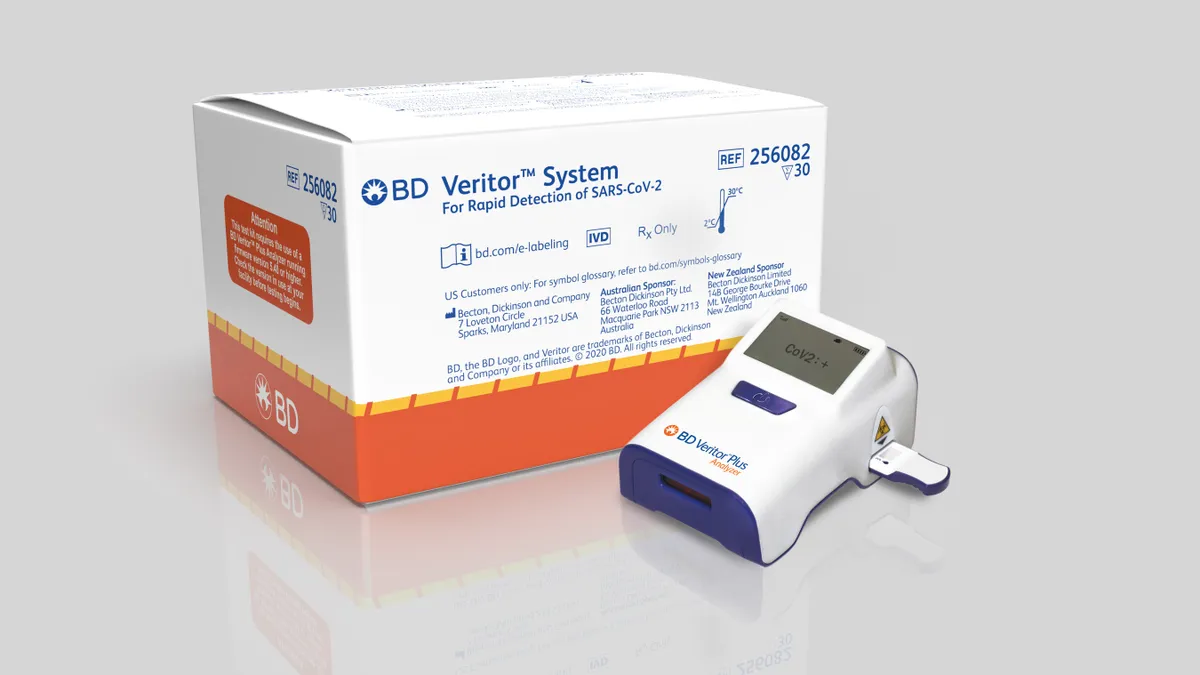Dive Brief:
-
BD on Thursday reported sales returned to growth in its fiscal fourth quarter as demand for COVID-19 tests offset ongoing headwinds in other areas.
-
Sales at BD's life sciences segment rose 31% in the quarter due to demand for coronavirus diagnostics that run on its Veritor and Max platforms, with some recovery of routine testing. The growth offset sales declines in its medical and interventional segments, causing BD as a whole to end the quarter up 4.4%.
-
BD became the latest company to forecast the continuation of the COVID-19 diagnostic boom, predicting Veritor testing sales could hit $1.5 billion next year and talking up the prospect of testing continuing into 2022. However, management expects price erosion on its antigen platform as it competes with Abbott's $5 test.
Dive Insight:
In its fiscal third quarter, BD felt all the downsides of COVID-19 and little of the upside. Life sciences sales grew 8% on a currency-neutral basis, a gain that was more than wiped out by declines in the medical and interventional business. BD sales fell around 10% during that quarter; however, the fourth quarter saw improvements on all fronts.
BD’s diagnostic business is now benefiting from demand for rapid antigen tests that run on its Veritor system, notably through a government contract that helped double the U.S. installed base within a quarter, and is also seeing its Max PCR platform rack up sales. With demand for routine testing rising back toward pre-pandemic levels, life sciences sales hit $1.5 billion.
COVID-19 testing accounted for $440 million of the sales, with the $340 million brought in by Veritor making the antigen platform the key growth driver. The performance reflects BD's ability to sustain a higher selling price for longer than expected; although, with Abbott selling its $5 tests, management expects price erosion.
Even so, BD expects Veritor to generate sales of $1 billion to $1.5 billion next year. CEO Tom Polen told investors on a quarterly results conference call to expect most of the sales to fall in the first half of next year, reflecting the potential for demand to decline as the pandemic is brought under control, but added he now believes "there is a higher likelihood for testing to continue into fiscal [2022]."
The jump in fourth quarter life science sales was big enough to offset continued weakness at the medical segment. Sales fell almost 5% in the quarter due to COVID-19, which mostly affected the medication delivery solutions, diabetes care and medication management solutions units, plus Alaris remediation.
BD recalled Alaris infusion pumps in February in response to injuries and one death. At one point, BD planned to file a 510(k) for Alaris in the fourth quarter but delayed its target in August, citing the impact of COVID-19. The pandemic enabled BD to provide Alaris pumps in the U.S. when deemed a medical necessity but it has generated limited sales via that option since April.
Polen used the quarterly results call to provide an update on the effort to start resuming sales of Alaris, telling investors his "confidence level today is higher than it was last quarter that we will be able to submit our 510(k) in late fiscal Q2 or early fiscal Q3 2021." However, Polen said it is likely to be fiscal 2022 before Alaris sales resume "given the size and complexity of the submission" and his CFO downplayed hopes of pent-up demand.
"Keep in mind we shipped pumps under medical necessity in fiscal 2020, thus we would not necessarily assume there is a one for one pent-up demand when we obtain 510(k) clearance," Chris Reidy told investors.










